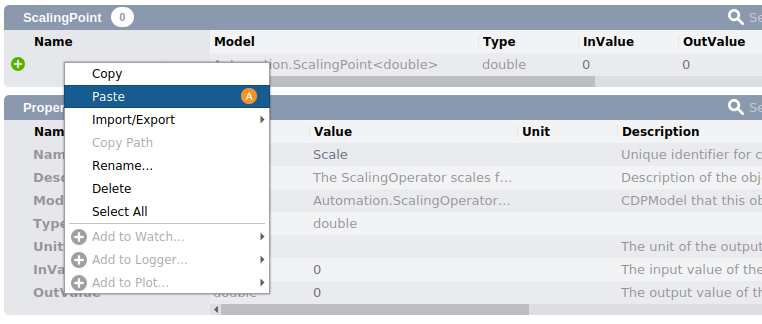ScalingPoint Class
(Automation::ScalingPoint)The ScalingPoint maps input value to the output value . More...
| Header: | #include <ScalingPoint> |
| Inherits: | CDPBaseObject |
Public Functions
| ScalingPoint() | |
| virtual | ~ScalingPoint() |
| T | GetInValue(bool inverse) |
| double | GetOffset() |
| double | GetOutValue(bool inverse) |
| double | GetScalingFactor() |
| void | RegisterConfigurationChangeCallback(const std::function<void( CDPPropertyBase * ) > &handler) |
| void | SetOffset(double offset) |
| void | SetScalingFactor(double scalingFactor) |
Reimplemented Public Functions
| virtual void | Configure(XMLPrimitive *pObjectElement) override |
| virtual void | Create(const char *pzName, CDPBaseObject *pParent) override |
| virtual const std::string | GetNodeName() const override |
- 50 public functions inherited from CDPBaseObject
- 27 public functions inherited from CDP::StudioAPI::CDPNode
- 22 public functions inherited from CDP::StudioAPI::ICDPNode
Additional Inherited Members
- 1 static public member inherited from CDPBaseObject
- 1 protected function inherited from CDP::StudioAPI::CDPNode
- 10 protected variables inherited from CDPBaseObject
Detailed Description
The ScalingPoint maps input value to the output value .
Properties
| Property Name | Description |
|---|---|
| Name | The name of the ScalingPoint. |
| Type | The type of the ScalingPoint. |
| InValue | The input value of the ScalingPoint. |
| OutValue | The output value of the ScalingPoint. |
| InValueRouting | The routing of input value for the ScalingPoint when using routed value. |
| OutValueRouting | The routing of output value for the ScalingPoint when using routed value. |
| Model | The model name of the ScalingPoint. |
Importing ScalingPoints
In cases where you need to add or change large number of prepared ScalingPoint value mappings, you can easily import them to CDP Studio from a spreadsheet application (like Excel or LibreOffice Calc) using the import features.
For ScalingPoint import you have to prepare a spreadsheet table (in Excel or LibreOffice Calc) in the specific format used in CDP Studio for import and export, like what is described in the Configure Mode Manual
For example, the following is a screenshot of the simple spreadsheet table prepared for 2 ScalingPoint import

And the following is a screenshot of the spreadsheet table for the case you already have 2 ScalingPoints added but you need to alter their InValues and/or OutValues

After you have the spreadsheet table prepared the easiest way to import ScalingPoints is just to select the rows in the table, copy them to the clipboard and then paste them to the CDP Studio

Note: You have to make sure the first column of the table matches exactly your CDP version number. CDP Studio does not import rows whose version number does not match.
See also ScalingOperator.
Member Function Documentation
ScalingPoint::ScalingPoint()
Constructs a ScalingPoint.
[virtual] ScalingPoint::~ScalingPoint()
Destroys the instance of ScalingPoint. The destructor is virtual.
[override virtual] void ScalingPoint::Configure(XMLPrimitive *pObjectElement)
Reimplemented from CDPBaseObject::Configure().
Connects InValue and OutValue Properties to InValueRouting and OutValueRouting when initialized.
[override virtual] void ScalingPoint::Create(const char *pzName, CDPBaseObject *pParent)
Reimplemented from CDPBaseObject::Create().
Argument CDPObjectBased is not used by this subclass.
T ScalingPoint::GetInValue(bool inverse)
Returns the ScalingPoint input value. Returns actually the OutValue property value when the ScalingOperator is in inverse mode.
[override virtual] const std::string ScalingPoint::GetNodeName() const
Reimplemented from ICDPNode::GetNodeName().
double ScalingPoint::GetOffset()
Returns the offset.
double ScalingPoint::GetOutValue(bool inverse)
Returns the ScalingPoint output value. Returns actually the InValue property value when the ScalingOperator is in inverse mode.
double ScalingPoint::GetScalingFactor()
Returns the scaling factor.
void ScalingPoint::RegisterConfigurationChangeCallback(const std::function<void( CDPPropertyBase * ) > &handler)
void ScalingPoint::SetOffset(double offset)
Sets the offset.
void ScalingPoint::SetScalingFactor(double scalingFactor)
Sets the scalingFactor.
Get started with CDP Studio today
Let us help you take your great ideas and turn them into the products your customer will love.